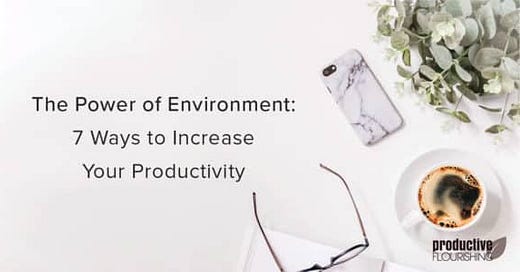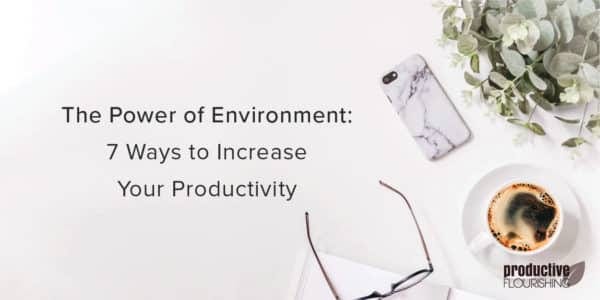The Power of Environment: 7 Ways to Increase Your Productivity
Knowing what your ideal workspace would be is a powerful way to work backward to an environment that works for you
Being an online business owner is tough, but it certainly has some perks, like being able to work almost anywhere. Many of us work out of home offices, which in theory is great, until you realize the reason you’re working in your underwear is because you have no clean laundry. Then you start the laundry, and pretty soon you realize you need another cup of coffee.
So you go fill up your cup, and you think how nice it would be to have a piece of toast with the raspberry jam you just picked up yesterday at the farmer’s market. Not like I’ve done any of that. Or did exactly that this week.
It’s a slippery slope if you’re not careful. Working at home isn’t a good option for me 95 percent of the time. Luckily, with evolving technology like tablets, laptops, and more, we have the freedom to work virtually anywhere. If you’re finding yourself getting distracted, it’s time to take a look at your options for work environments
Knowing what your ideal workspace would be like is a powerful way to work backward to an environment that works for you. If your space would have big windows to let the sunlight and seaside vista come in, you know that your desk in the corner of the basement is temporary and that it may be time to get some beach posters and better lighting.
The following are some environmental factors to consider when thinking about whether your environment works for you:
Sound. Consider workers talking in the background, the sounds of a coffee shop, the buzz of children playing in the distance, the hum of the ceiling fan, the babbling of a brook, or the hustle-bustle of a busy city street. Each sound affects us differently. Figure out what background noise best serves your best work.
Smell. It’s obvious that disgusting smells can make it hard to focus, but there may be smells that really get you in the zone. Of all the senses, our sense of smell brings us closest to our memory center, so smells can have a powerful effect on getting us in the zone.
Sunlight. Studies show that sunlight affects our moods, and there’s a right amount for each of us. Night owls often prefer working in darker rooms.
Clothing. Yes, what you wear is part of your environment and is worth considering. Pants that don’t fit in all the wrong places can be distracting, as can be itchy socks. It’s also true that you may not take yourself or your work seriously if you’re working in your pajamas and a shirt you’ve been wearing for the last three days. It may also be that those pajamas and shirt make up your lucky outfit. If it works for you, I’m not judging.
Clutter / Organization. It’s not necessarily true for everyone that a clean desk equates to a clean mind, as I’ve witnessed people who can’t focus with a clean desk or in a Zen / spartan environment. Your tolerance for clutter or tidiness may also depend on the space in question.
Amount of Space. Some people like the coziness of small rooms with lots of furniture, shelves, and so on, whereas others prefer more spacious rooms with less furniture. Like clutter, it could also be that only parts of your work area need to be spacious. Even further, it could be that certain kinds of stuff in your space create different feelings for you.
Music. While studies show that listening to classical music increases focus and creativity, you may not be able to concentrate with it. It may be that certain kinds of music work for you or really don’t work for you, or the level of music makes a lot of difference. For instance, I typically can’t do focus blocks while listening to music with spoken words, but the “This is Coheed and Cambria” playlist on Spotify has been in the background for much of the drafting of my book, Start Finishing; Jack Johnson radio on Spotify powers my admin blocks. Coheed and Cambria is an uncharacteristic choice, but it just works. Your best-work music may be similarly variable and unusual.
They say you’re the sum of the five people you spend the most time with. I think you can say the same for places. (Tweet this.) Where do you spend your time? And how's that working out for you?
Revamp your environment and rejuvenate your creative process. If you want to learn more ways to increase your productivity and go from idea to done, grab Start Finishing.





